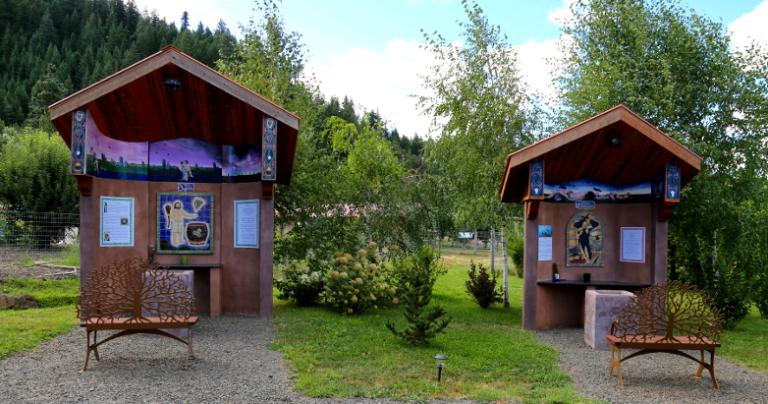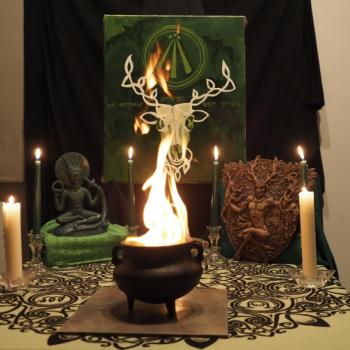You’ve been a Pagan for a while… or a Druid or a Heathen or a witch or whatever your religious and spiritual identity happens to be. You’re happy with it. This is where you belong and you can’t imagine doing anything else.
But lately you’ve felt the need for something… more.
It’s not that anything’s wrong. It’s not that the ordinary world is overwhelming you. The ordinary world may very well be overwhelming you, but this isn’t a desire to get away from it all. This is a desire to move toward something deeper, more magical, more sacred.
Except you’re not quite sure what that means.
Sometimes a God grabs you by the collar and says “you – go do this!” Usually, though, the call to something deeper comes more subtly. At first you’re barely aware of it. Then you notice it, but you’re busy with other things and so you ignore it. Or maybe you’re afraid of it. Eventually the desire grows to the point where you have to do something. But what?
These are five practices that have worked for me. I’m doing some of them now. They’ve worked for me in the past and I’m confident they’ll work for me again.
And I’m confident they’ll work for you too.
You don’t have to go deeper unless you want to
If you’re satisfied where you are you don’t have to do anything more. If you recently took a step deeper and you need to stabilize first, don’t feel pushed to add even more right away.
I grew up in a fundamentalist Baptist church where the preacher would regularly scream “I want people to get on fire for God!” What he meant was “you aren’t doing enough.” He said that to the old ladies who kept the church going for decades but couldn’t hold office because they were women. He said that to the young couples who were struggling to deal with more children than they could afford. He said that to lonely people who just wanted to be a part of a community.
I never want Paganism to be like that.
I want Paganism to be as accessible and welcoming to the plumber and the accountant as it is to the priestess and the mystic. Your place in the Big Tent of Paganism is where you belong, and you get to decide where that is.
At the same time, the fact that some people are happy at one level of spiritual depth doesn’t mean everyone will be happy at that level. If you’re called to something deeper – if you want something deeper – go after it.
1. Increase your regular spiritual practice
Regular practice is the foundation of any spiritualty in any religious context. Prayer, meditation, making offerings, following the Sun and the Moon, celebrating the seasons – all those things we do that bring structure and meaning to our Paganism. If you want to go deeper, the simplest step is to simply turn up the volume on your regular practice.
One of the primary elements of monasticism in any tradition – including Pagan Monasticism – is an emphasis on discipline. There are certain core practices that are done every day, every week, every season, whether you feel like it or not. Those practices build a foundation that will support you in difficult times.
If you’re comfortable with what you’re doing, get uncomfortable. If you’re praying once a day, pray twice a day. If you’re meditating 10 minutes a day, meditate 20 minutes a day. Add a new spiritual practice you aren’t currently doing. Don’t overload yourself – martyrdom is not a good thing – but do challenge yourself.
There’s nothing like more spiritual practice to build more spiritual depth.
2. Build a shrine
A shrine is a place of honor – and you can honor anyone you feel called to honor. Maybe that’s the deity you’ve been talking to for the past few months. Maybe it’s your ancestors, or a particular ancestor. Maybe it’s a local spirit of place. Whatever – whoever – you feel called to honor, build a shrine for them.
What a shrine looks like is limited only by your imagination and your resources. I love the shrines Kirk Thomas has built (and continues to build) at his place at Trout Lake Abbey. That’s beyond what most of us can do. Perhaps you can set up a shrine on a book shelf. Maybe you can build a shrine in a box that you can carry with you.

Start by spending time in meditation – what should be in your shrine? How can you best represent and honor whoever it is you’re honoring? Do some reading, and some internet searches. Draw plans, or at least a diagram. Do some sort of ritual when you begin construction, and another when you’re done.
Once your shrine is complete, you have to maintain it. Make regular offerings. Pray and meditate in front of it. Let it become a meeting place for you and the person(s) to whom it’s dedicated.
Both the journey and the destination are important. Building a shrine will help you take your practice deeper, and maintaining it will help you keep it deep.
3. Start a big magical working
Perhaps your practice is less devotional and more magical. Or perhaps – like me – it’s both. Either way, one of the best ways to deepen your practice is by doing a big magical working.
I’m not big on grimoire magic, but if you are there are plenty of rituals and workings there for the doing. Read through them carefully, do all the necessary preparations, and follow the instructions implicitly. Even if you can’t get a demon to appear in a triangle with a bag of gold, going through the steps will strengthen your practice.
I’ve had good luck with hypersigils for big workings: carefully planned visualizations that create a reality in the world of spirit so it can manifest in the ordinary world. Aidan Wachter’s book Weaving Fate is the best introduction to hypersigils I’ve come across. I have two long-term hypersigils going now – all I’ll say is so far so good. I have a couple other shorter-term workings going as well.
Again, both the journey and the destination are important. The process of planning and creating a big ritual or a long-term working brings its own depth. But as with all magic, you need a destination – you need a target. Last year I tried to start a big working without a clear goal in mind – it went nowhere.
Find a destination and then plot a course – and then watch your practice deepen.
4. Read something new and different
If you feel like you’re missing something but you can’t figure out what it is, it may be that your imagination needs to be stimulated. So stimulate it – read!
Reading anything is good. Myths are timeless and books in your tradition are meant to be studied, not read once and then shelved. But if you need stimulation, try reading something new. Read a book in a different Pagan tradition. Tackle something that was too dense the first time you read it – or tried to read it. Get out of the Pagan section of the book store – read history, anthropology, biology, or physics.
Or read fiction. Good magical fiction can be incredibly inspiring. No, we can’t do the things that fictional witches can do. But reading about fictional magic always inspires me to do more real magic. And sometimes an author comes up with something that has more than a little truth to it. I’m working on something now I got out of a fantasy novel. As written, it’s simply not possible. But there’s a concept in it that does work (it’s part of traditional high magic) and I need to figure out how to make it work for me. I’ll write about it when I’m done, though that won’t be any time soon.
Movies and TV shows can be helpful too. They can also be distracting. If you want a sure way to take your practice deeper, read.
5. Start a small group practice
I love big group rituals. But my deepest and most meaningful spiritual experiences have been in small group workings. My first Pagan initiation was in a group of three. My first ecstatic experience of Cernunnos was in a group of seven. Three or six or nine can raise more energy than one.
A small group allows you to divide up the work, to support each other during the working, and perhaps most importantly, to help everyone remember what happened and figure out what it means.
My caution with small group practices and workings – whether they become a recurring practice or if they’re just a one-time thing – is to choose your members carefully. You don’t need the most powerful witches or the most brilliant ritualists (although those are certainly nice to have). What you do need are people who are in agreement as to the group’s goals and methods. There is no credal test to dance the Maypole, but if we’re trying to facilitate an ecstatic experience I need to know that everyone there sees the Gods as real, distinct, individual persons and not as archetypes or metaphors or anything else.
Deeper workings can be done solitary, but they’re much easier and much more likely to be effective in a small group setting.
Do one, or two, or all five
You don’t have to do all these things. Pick one, start there, and see how things go. When you’re ready, add another. Or start with more than one. Don’t overload yourself, but do challenge yourself.
Because if you’re feeling the need for something deeper, something more, you’re going to have to get into the deep water. You can wade into it or you can dive into it.
Either way you’re going to get wet. Start moving toward the water.


















